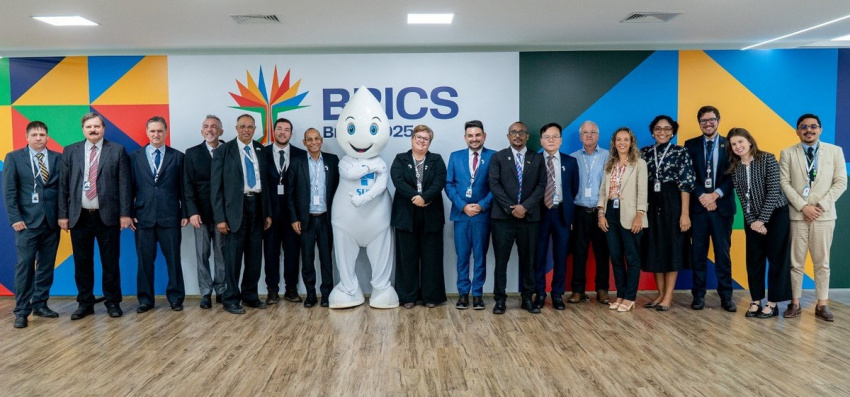BRICS joins forces to fight tuberculosis and strengthen vaccine production

The 18th meeting of the BRICS Tuberculosis Research Network took place last week, bringing together, in person, the five founding countries of the group and the thematic network — Brasil, Russia, India, China, South Africa — as well as Ethiopia. During the meetings, researchers agreed to join efforts to expand partnerships in the development of new vaccines against the disease and to develop faster treatments.
“A large number of BRICS countries face a high burden of tuberculosis. India has the highest number of cases; South Africa is among the most affected; Brazil is also classified as a high-burden country; and Indonesia, which joined this year, currently ranks second in incidence. In this context, we face many challenges, and the network aims to work jointly to overcome them. So, we face many challenges, and this network aims to work together to overcome them. As a result of the meeting, we expect to identify key strategies to mobilize resources for this group, list the main research efforts and investment priorities, whether in vaccines or new drugs,” explained Fernanda Dockhorn Costa Johansen, General Coordinator of Surveillance for Tuberculosis, Endemic Mycoses and Nontubercular Mycobacteria at the Ministry of Health. She coordinated this meeting of the member countries.
The creation of new vaccines to combat tuberculosis is among the priorities set by the network. Currently, the most widely used immunizer worldwide to prevent severe cases of tuberculosis is the BCG — administered in Brasil to newborns. However, this vaccine has some limitations.
“We are looking forward to the new vaccines, which should begin in 2029. And, of course, this will be a game changer, because the only vaccine currently available is BCG, which is over 100 years old. It is clearly not very effective. In fact, it only protects young children from developing severe forms of tuberculosis, such as tuberculous meningitis. Now we have the chance to reduce the tuberculosis incidence curve and accelerate progress toward eradicating the disease. This requires several years of preparatory work. We need to review regulatory principles in different countries. Assess the capacity to introduce these new products,” said Tereza Kasaeva, Director of the Global Tuberculosis Programme and Lung Health at the World Health Organization (WHO).
The BRICS tuberculosis network aims to participate in clinical trials of new vaccines being developed globally. One of them is Brazilian and currently under research at Fiocruz. “A vaccine specifically for tuberculosis has started its research process at Fiocruz, at Bio-Manguinhos, and is still in the very early stage of animal models. We hope to develop a national vaccine with a new RNA-based technology. We expect some news by 2030,” detailed Fernanda Johansen.
WHO representative Tereza Kasaeva praised Brasil’s pioneering role in attempting to develop a national tuberculosis vaccine. “This was a very inspiring move. Brasil made the decision to renew vaccine production in the country. And this local manufacturing is another important tool. Because dependency on certain foreign manufacturers is one of the reasons why access is not always timely, not equitable, and why vaccines and other products are not accessible to most of the population,” she said.
“BRICS countries are not only a major political power, but they are also recognized for their expertise in various areas related to global health. Here we are discussing tuberculosis, in particular. We must say that not only do BRICS countries account for over 50% of the global tuberculosis burden, but all major specialists are in BRICS countries. If we look at what has been done in terms of new tools introduced, new guidelines, new strategies, BRICS representatives played a central role in all of these efforts,” Kasaeva also noted.
Finally, the WHO representative stated that BRICS can become a leader in global health. “The world is looking to BRICS with great expectation, declaring its willingness and prioritizing global health on its agenda. The world seeks this leadership and needs it right now, in this challenging moment. And we hope that BRICS countries make this clear,” she said.
Another point highlighted by the group is the need for faster tuberculosis treatment, as explained by Sanjay Kumar, India’s representative in the BRICS Tuberculosis Research Network.
“If you look at the simple form of tuberculosis, patients need to continue treatment for six months. When it comes to complex, drug-resistant tuberculosis, the duration becomes even longer. Right now, we are achieving good results with the drug BIPAL-M. Before that, the treatment duration could be up to two or three years, with multiple medications being administered,” said the Indian delegate.
Funding for this type of research is also a concern for member countries. “We now hope, under Brasil’s leadership this year, to seek new funding sources to keep research initiatives going. In particular, there has been a significant drop in research due to financial dependence on countries outside the group,” warned Barry Kistnasamy, Health Compensation Commissioner of South Africa.
“We need to strengthen these exchanges, as well as the flow of products coming from different countries, whether they be new vaccine trials or new medications. There has been some collaboration in multinational trials, but not enough, so we need to deepen this process. We need to start looking at new mechanisms of collaboration and how to fund them,” added the South African representative.


